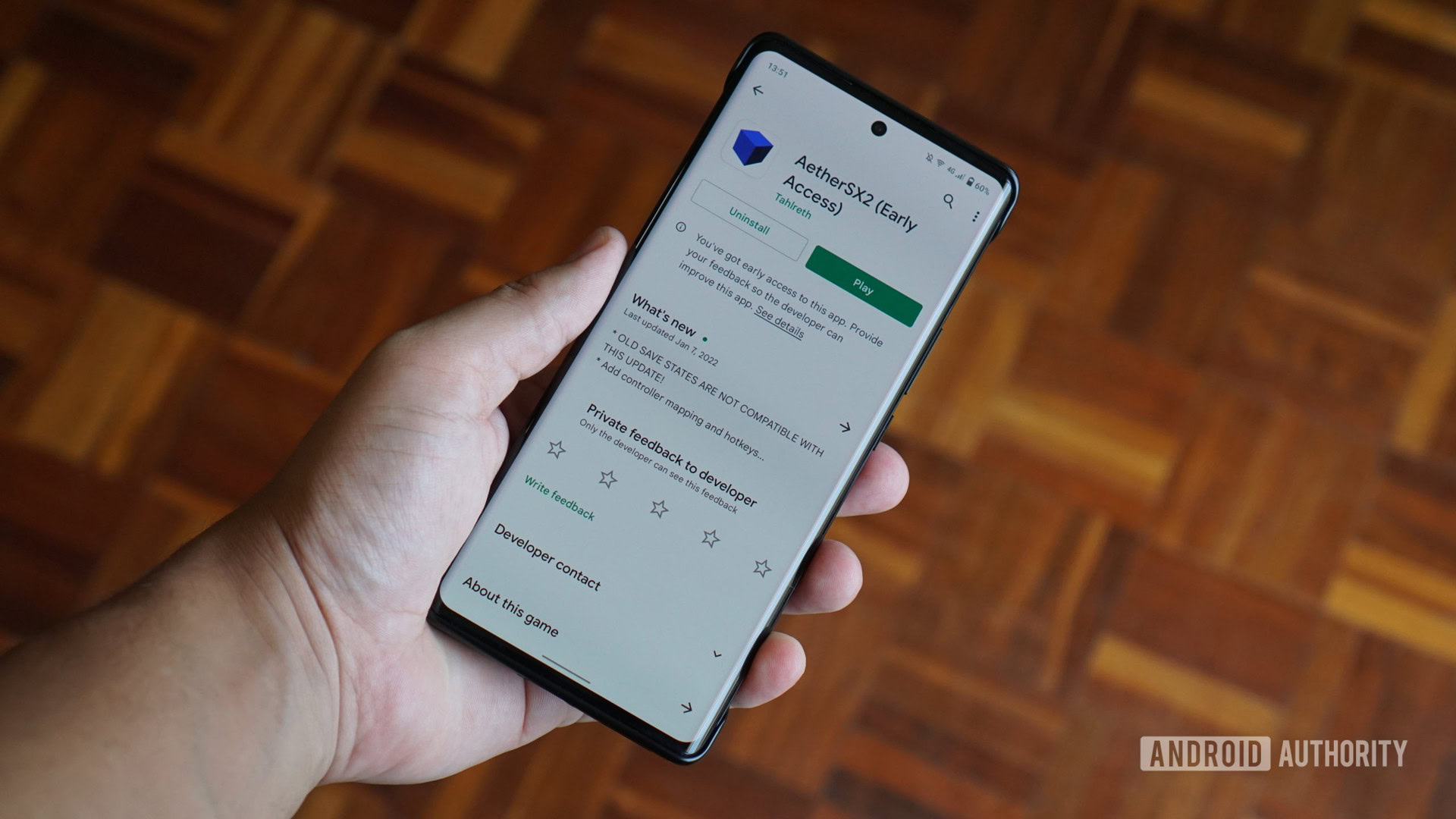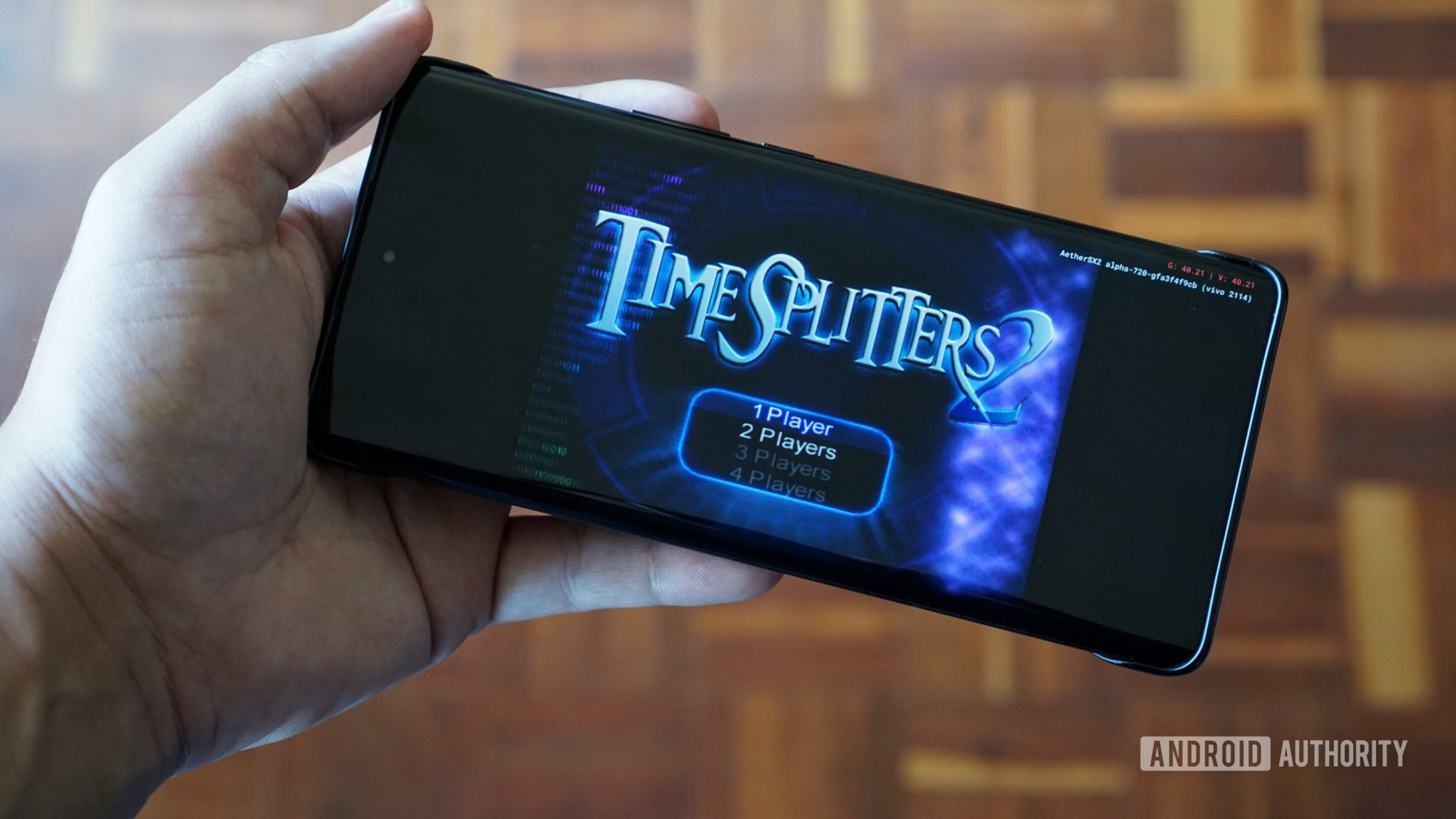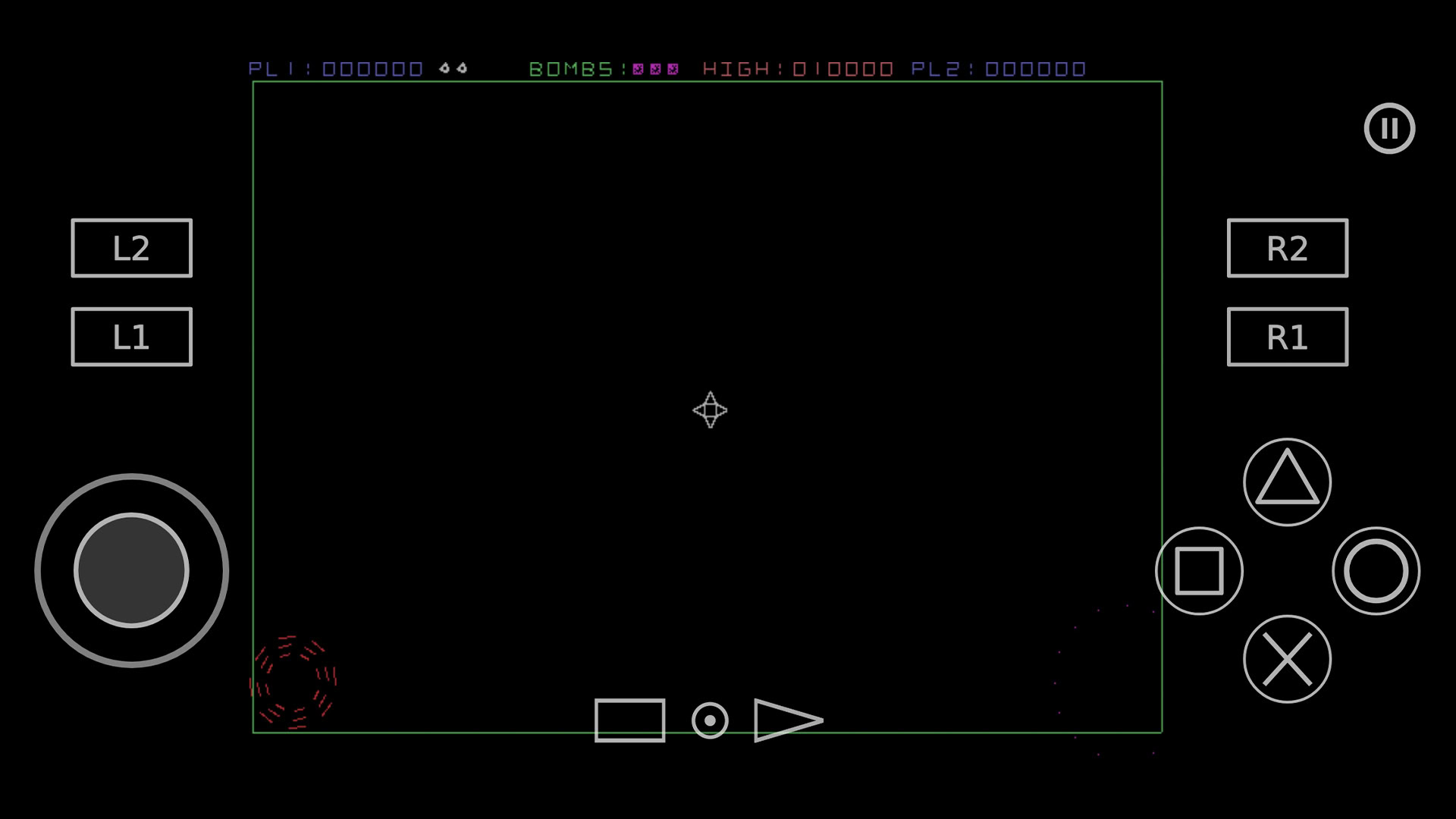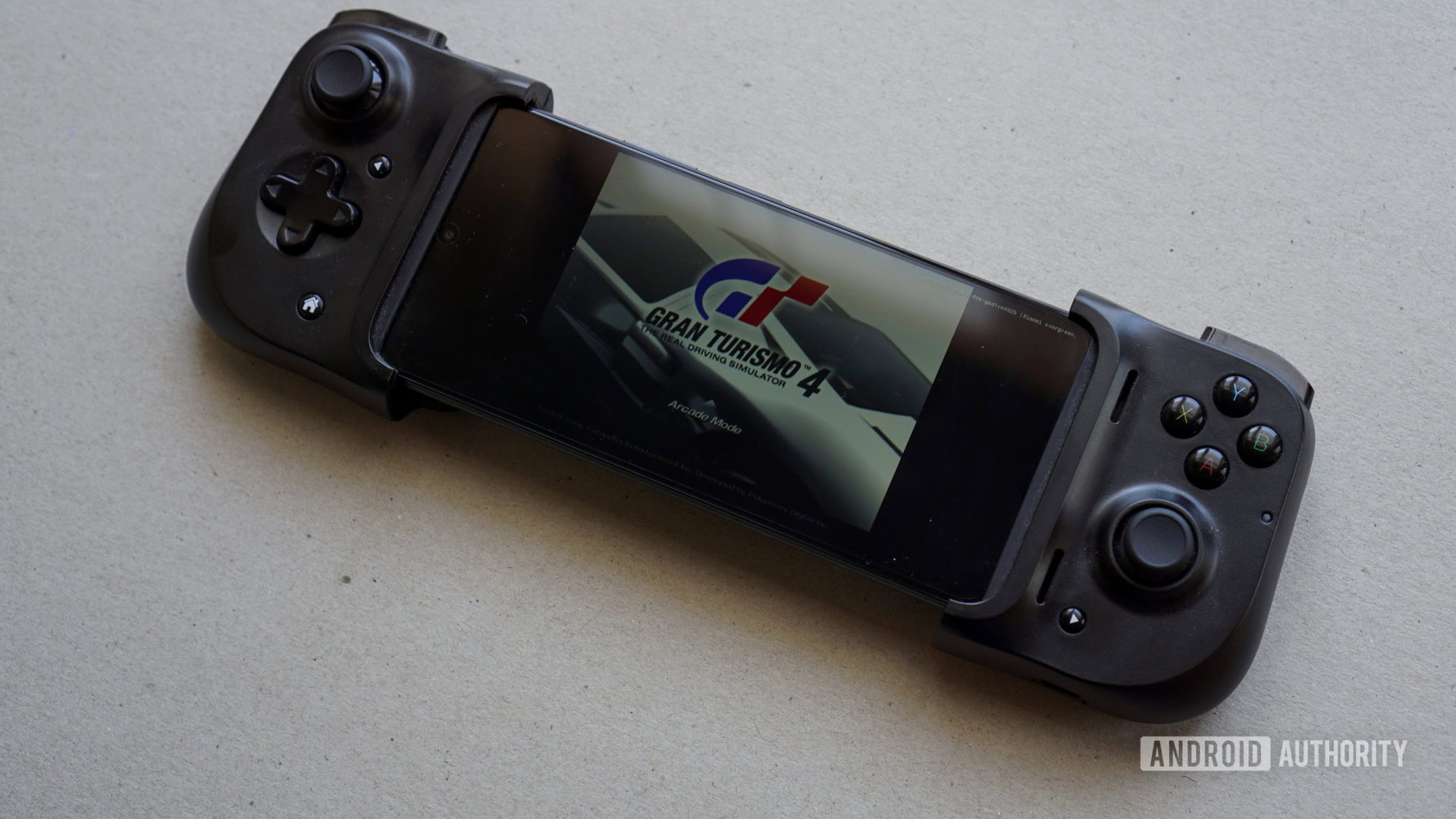Affiliate links on Android Authority may earn us a commission. Learn more.
AetherSX2: What you need to know about the best PS2 emulator for Android

May 2024 Update: AetherSX2 is no longer available on the Google Play Store, likely as a result of Nintendo shutting down Yuzu earlier in the year. Instead we recommend sideloading NetherSX2, which runs on an updated version of the same emulator, but without the ads. The original guide can be found below, and much of the setup will be the same.
Android is a fantastic platform for emulation, as everything from Atari and the NES to PS1 and GameCube can be played on your modern smartphone. However, one of the biggest challenges in this space has been PS2 emulation, with the likes of Play and the shady DamonPS2 emulator taking a stab at the task. Finally, a high-quality PS2 emulator landed on Android in late 2021, dubbed AetherSX2.
You only need to try out a few games to realize that this is easily the best PS2 emulator on the platform. So what should you know about it? We’ve got you covered with our guide to the emulator.
A brief history of AetherSX2
AetherSX2 is the brainchild of one person, a developer who goes by the handle Tahlreth. The developer actually used the PCSX2 emulator as the basis for their Android-based emulator. PCSX2 is a long-running, well-established emulator on PC, so it makes sense to take advantage of the work that has gone into this program.
The developer of AetherSX2 got the green light to use the PCSX2 code from the developers themselves and is licensed under the LGPL license — unlike the DamonPS2 developers, who stole the code and didn’t follow the requisite license.
In any event, the emulator was initially released in December 2021 via the Google Play Store as an open beta. You can also sideload the APK via the AetherSX2 website. We’d recommend you steer clear of any other websites claiming to offer the APK.
The AetherSX2 emulator is a major step forward for emulation on Android devices.
It’s also worth noting that the app is free to download and use, so don’t be duped by anyone saying you need to pay for it. This is in contrast to the DamonPS2 emulator, which is filled to the brim with ads and charges for a Pro version limited to two devices.
In saying so, a major turn of events happened in March 2023 when the app was reportedly updated with ads. You can still find the older, ad-free versions of the app via the fan-run Discord server and this archived link. Additionally, the developer has ceased development on the app after persistent death threats, so anyone that you might see claiming to represent the app is lying.
A few months later, the app was removed from the Play Store. Currently, the best way to use AetherSX2 is by downloading NetherSX2, a patched version of the original app without ads.
What are the AetherSX2 requirements?

AetherSX2’s developer recommended that your phone have a Snapdragon 845-level processor or better. They specifically said that you’ll need four large CPU cores (Cortex-A75 or higher).
In terms of the GPU, the developer says Adreno graphics offers better performance than Mali or PowerVR GPUs found in MediaTek, HiSilicon, and older Samsung Exynos processors. However, the creator adds that you should stick to the Vulkan graphics renderer option if you’ve got a phone powered by a Mali GPU (e.g., Exynos, Kirin, or MediaTek processor), as it’s generally faster than OpenGL. Some games might perform better with OpenGL, though.
AetherSX2 has some recommended requirements, but performance actually varies by wildly by game.
Don’t fear if you’ve got a mid-range phone, as performance varies from game to game. So graphically advanced 3D titles might not work on your budget device, but 2D titles might work just fine. In fact, some users report that phones with budget silicon, like the Snapdragon 665, Snapdragon 720G, Exynos 9611, and Helio G80 run some 2D games fine — although you’ll almost certainly need to tweak a few settings to get playable results.
One hard requirement is that you need a 64-bit processor and a 64-bit version of Android. That rules out phones from 2014 or earlier in particular. Devices like the NVIDIA Shield tube model also use a 32-bit version of Android.
It’s worth stressing again that AetherSX2 is a demanding emulator. So if you’ve tried tweaking various settings and a game still won’t run properly (particularly on budget hardware), you either have to wait for an update or accept that your desired games won’t work on your phone. But at least there are loads of other console emulators on Android that have more modest requirements.
Setting up AetherSX2

Got a decently powerful phone and downloaded the app? Before you can get playing, you’ll need two things. That would be a PS2 BIOS (the firmware that came with the original console) and PS2 ROMs or ISOs. We’re not linking you to either for legal reasons, but Google is your friend. Just remember that you’ll need to own the games you’re downloading, from a legal perspective.
AetherSX2 has a setup wizard to get things going. It allows you to set different compatibility profiles (“optimal/safe” if you have a mid-range or high-end device, “fast/unsafe” if you need a speed boost at the expense of stability), select the downloaded BIOS to use, and choose the directory containing your downloaded PS2 ROMs/ISOs.
You can also navigate to the Three-line menu button > App Settings > BIOS to add the BIOS this way. Forgot to add your directory of games during the setup wizard? Then you can get this done via the Three-line menu button > App Settings > Game List > Plus icon.
You’re free to use the touchscreen controls for AetherSX2, but the app also supports gamepads (e.g., Bluetooth and USB-C). We recommend a physical controller for faster-paced titles like action games, racing, and platformers. You can check out our list of the best Bluetooth controllers, but I’ve used the Razer Kishi USB-C gamepad for a battery-free experience.
What about real-world AetherSX2 performance?

I’ve tested the emulator on the Snapdragon 8 Gen 1-powered vivo X80 Pro, vivo X70 Pro Plus (Snapdragon 888 Plus), the Xiaomi Mi 9T Pro (Snapdragon 855), and the Dimensity 810-equipped POCO M4 Pro. Tested titles include Ace Combat 5: Squadron Leader, Burnout 3: Takedown, Fire Pro Wrestling Returns, Gran Turismo 4, Marvel vs Capcom 2, Shadow of the Colossus, The Simpsons Hit and Run, and WWE Smackdown: Here Comes The Pain.
The two 2022 flagship phones ran all of these games at a very playable pace, so 2023’s flagship phones running the Snapdragon 8 Gen 2 should deliver a smoother experience. Meanwhile, Xiaomi’s older flagship ran most of these games just fine, but Burnout 3 was an unplayable, slow-mo affair out of the box.
You can play some less demanding games on budget devices, but you'll want a recent high-end phone for the best performance.
On the other end of the spectrum is the POCO M4 Pro. It features a recent mid-range processor in the Dimensity 810. Games like Burnout 3 and Gran Turismo 4 are too slow to be playable out of the box. But underclocking (more on this later) does help with titles like The Simpsons Hit and Run and Shadow of the Colossus. It makes them less of a slow-mo experience and more playable. And less demanding 2D titles like Fire Pro Wrestling Returns, MegaMan X Collection, and Marvel vs Capcom 2 run well.
This is far from comprehensive evidence of how your experience will go, as this is just a small selection of games with basic tweaks being used at best. Still, it should give you a rough idea of what each phone segment is capable of. But it suggests you might want to opt for an older flagship instead of a new budget phone.
Tips and tricks for a better experience
Being an advanced PS2 emulator, AetherSX2 can be a major challenge for smartphones. It doesn’t help that hundreds of phone models and dozens of processors are out there. Fortunately, the developer includes several features and offers plenty of tips.
- Try changing the graphics renderer from OpenGL to Vulkan, for one. The Vulkan API generally delivers a fast experience but might not deliver the best experience for all games.
- This leads to our next tip. In case you didn’t know, you can tap and hold on a game listing to adjust settings only for that title. This is handy if you’ve got one game that requires plenty of tweaks, while the rest of your library works just fine with minimal changes.
- The developer also recommends that those with slower phones try underclocking the emulated console’s CPU. This can be accomplished by visiting the Three-line Menu button > App Settings > System, then choosing the EE Cycle Rate (Underclocking) and EE Cycle Skip (Underclocking option) fields. The EE Cycle Rate should be changed to a negative number, while the Cycle Skip should be set at a positive number.
- Another handy tip from the horse’s mouth is to enable the Multi-Threaded VU1 option (found in the Three-line menu button > App Settings > System). This can also bring a significant speed boost but requires at least three big CPU cores. Enabling this on a phone with only two big cores could result in slower speeds.
- Three other settings worth toggling for better performance include the GPU Palette Conversion, Preload Textures, and Disable Hardware Readbacks options.
- One way to potentially get better performance that has nothing to do with the app is to switch from your phone’s default power profile to a performance mode (usually available in battery settings). This increases performance at the expense of battery life and temperature. Just keep in mind that higher temperatures can also lead to faster throttling. This could make the default power mode better for longer play sessions.
- AetherSX2 also supports resolution upscaling, from 1x (the original resolution of the game) all the way to 8x. This doesn’t work well with every game. Still, it’s worth experimenting with this option if your preferred game has some headroom for a higher resolution.
- The app does support save states, but updates tend to wipe them. Save to the virtual memory card in every game if you don’t want to start from scratch after every update.
FAQs
You can access your virtual memory card (which uses a .ps2 file extension) by opening a file manager and visiting Android > data > xyz.aethersx2.android > files > memcards and copying the relevant file. This should then be sent to the other Android device. You can import the old memory card from the new Android device by choosing “import memory card” from the sidebar and navigating to the relevant file in the resulting file manager window.
The emulator is technically capable of this to an extent, but it’s definitely not made with this in mind, and the support is very rudimentary. We strongly recommend you download an emulator like Duckstation for more polished, feature-rich PS1 emulation with a wider variety of compatible games.
Yes, there’s a very helpful community-driven spreadsheet detailing performance and compatibility in various titles. It also lists the chipset used to play each game, giving you an idea of whether your phone is powerful enough to run it.
One option is to use the Dolphin GameCube emulator if the title in question has a GameCube port. You could also upgrade to a new phone, although you’ll need to double-check that the new phone plays the desired game. It’s still risky to upgrade to a new phone specifically for an emulated title that might not work in your case.
You can use the fan-run Discord server or the EmulationOnAndroid subreddit.